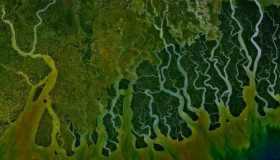Get our round up in your inbox. Sign up on the front page.
What really happened in New Zealand?
This week lots of news outlets claimed that New Zealand created the first “climate change refugees” by granting refugee status status to a family from Tuvalu. This is not completely accurate, but the case is still important and interesting. Here is our analysis of the case:
“New Zealand has just granted residence to a family from Tuvalu. The impacts of climate change in Tuvalu were part of the family’s court case. The case contained several refugee, human rights and humanitarian elements. The claim for refugee status because of climate impacts was rejected. Several human rights claims were also rejected. However their request for residency on humanitarian grounds was granted. Their case detailed how climate change had affected the humanitarian situation in Tuvalu.”
Our analysis also explores how many people this ruling could affect, and the wider policy issues of climate change and migration in the Pacific. UKCCMC
Intrepid PNG woman leads relocation of island community hit by climate change
Ursula Rakova was born in a tropical paradise .. “The sea that we love to swim in is now turning against us,” she told participants in the first “Summit on Women and Climate” in Bali, Indonesia this week. Rakova’s plan was far-reaching: she is leading the permanent resettlement of some 2,000 climate refugees from the atoll to mainland Bougainville, a three-hour ride on a wooden boat on a good day. She is also making sure the islanders will be self-reliant in their new homeland. AlertNet
Climate change, conflict, and cooperation
Although water variability has already been observed across river basins, climate change is predicted to increase variability. Such environmental changes may aggravate political tensions, especially in regions that are not equipped with an appropriate institutional apparatus … The paper investigates to what extent particular mechanisms and institutional designs help mitigate inter-country tensions over shared water.
New Film on Climate Change and Migration in Bangladesh
Bangladesh is one of the most climate-vulnerable countries in the world. How can millions of Bangladeshis protect their families and incomes from rising sea levels, erratic rainfall and temperature extremes? The film-makers follow a group of researchers as they investigate how climate change is causing people to migrate within Bangladesh, as a way of coping. Sussex Global
Alex Randall coordinates the UK Climate Change and Migration Coalition. He is author several reports on migration and climate change. He writes regularly on migration, displacement and climate change for a number of outlets.


